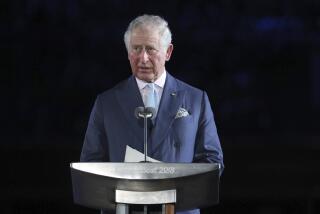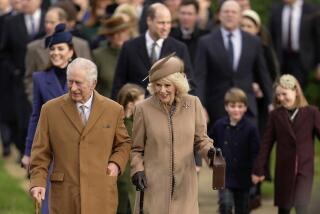The Call of Balkan Realms
- Share via
BELGRADE, Yugoslavia — Sitting on a bench in this decayed capital, a retired high school teacher poured out his pain from long years of misrule, wars, international sanctions and social rot.
“You can see these people are very beautiful, very good-looking,” said Vojislav Todorovic, 69, motioning toward downtown passersby. “But they are very sad. Hardly anyone smiles in this country. Everything was destroyed. People have nothing. . . . Everything has a bad stench. Love is gone. Young people have totally wrong values.”
Todorovic sees hope, however, in Crown Prince Alexander II Karadjordjevic, the London-born heir to the Yugoslav throne, who moved into an ancestral palace in Belgrade last summer and has worked hard to build his popularity.
“I look forward to the moment when he will become king,” Todorovic said. “The monarchy would overcome the divisions among the people.”
During decades of communism, Alexander and other exiled Balkan royalty were nearly forgotten. Now kings and princes, queens and princesses are reemerging from exile, moving into old palaces and seeking political influence, monarchical restoration or simply ways to serve their nations.
This second chance for the region’s crowned and would-be-crowned heads has arisen out of the social upheaval that followed the collapse of communism. It reflects the shortcomings of party politics in countries without strong democratic traditions, and a desire to get beyond the tragic memories of Nazi and Communist rule by restoring proud traditions. Throughout the Balkans, broken societies are searching for saviors.
The region’s young democracies would be strengthened by restoring their monarchs, supporters argue. They often cite Spain’s return to a monarchy with Juan Carlos I’s ascension to the throne in 1975 and the king’s role in backing democracy after the death of dictator Francisco Franco.
Most Balkan royals say they favor Britain’s constitutional monarchy, where Queen Elizabeth II plays a figurehead role as head of state and symbol of the nation while real power lies with the elected government. At the very least, all the royals aim to be symbols of unity for their troubled nations. Most have tried to nudge their countries toward restoring their thrones, without appearing too eager.
But so far, support for the constitutional changes needed to reinstate monarchies has not been strong. The politics of the region, however, are unpredictable.
Bulgarian voters’ longing for a royal solution already has catapulted former King Simeon II Saxe-Coburg-Gotha of Bulgaria--a long-ago child monarch who until last year was an obscure Madrid businessman--into real power for the first time in his adult life. He created a party that came out of nowhere to win elections in June, making him prime minister.
Alexander, 56, is a former insurance broker with British manners and a limited ability to speak his people’s language--but a knack for the public relations of monarchical restoration. He is now prominent in Belgrade’s elite, and some who once dismissed him as a joke believe that he may have a growing role to play--especially if the ruling coalition self-destructs from infighting.
An Ipress poll released last month in Serbia, the dominant republic of Yugoslavia, showed 20% of respondents favoring restoration of the monarchy. That level of support is enough to make Alexander a player.
Saxe-Coburg-Gotha, 64, also reflects the orientation of someone who from childhood has been imbued with the democratic values of Western Europe. But he has the advantage of speaking fluent Bulgarian.
Claimants to Thrones
The other claimants to the region’s thrones are Romania’s King Michael I Hohenzollern-Sigmaringen, 80; Albania’s King Leka I Zogu, 62; and Prince Nicholas II Petrovic Njegos, 57, of Montenegro, the smaller republic in Yugoslavia.
During his reign in World War II, Michael was a figurehead controlled by a pro-Nazi regime. But in 1944 he led a coup that moved his country to the Allied side. Only in the last year has he won full acceptance from Romanian authorities, enjoying a reconciliation dinner in May with President Ion Iliescu, a former Communist. Michael has recovered some dynastic properties--including a 17th century castle--but is based in Switzerland, where he has lived for decades.
Leka, a 6-foot-8-inch gun-toting former arms merchant living in South Africa, faces charges in Albania of carrying an unlicensed firearm, which stem from a violent 1997 riot he allegedly provoked the last time he was in the country. Although he has yet to return to Albania, Leka claims that he could bring political stability and unity--and has expressed support for expansion of the nation’s borders to include heavily ethnic Albanian parts of neighboring countries.
Nicholas is a Paris architect who seems mainly interested in supporting the arts in Montenegro but also has said he would be happy to be king. He has use of part of the Blue Palace, the former royal residence in Cetinje, once Montenegro’s capital. The republic has named him its unofficial representative in Paris.
These men, however, do not play such important roles in the life of their homelands as do Crown Prince Alexander and Prime Minister Saxe-Coburg-Gotha.
A man of liberal ideas and democratic tendencies, Alexander spoke out repeatedly from both inside and outside Yugoslavia against then-President Slobodan Milosevic in the 1990s, before such opposition became popular. More recently, Alexander helped unify the country’s democratic opposition.
Some critics disparage his Serbian, which he speaks with a heavy accent, atrocious grammar and a frequent inability to come up with the right words. Aleksandar Nikolic, a Belgrade bookstore owner, recalled hearing the crown prince speak at an opposition rally while Milosevic was in power. “I was laughing all the time,” Nikolic said. “The way he puts his sentences together in Serbian is ridiculous.”
But Alexander’s royal bloodline can still work magic.
In the spring of 1999, as the North Atlantic Treaty Organization’s bombs were raining down on Yugoslavia, Zoran Djindjic--then a key opposition leader who is now Serbia’s prime minister--was being interviewed when his mobile phone rang. The caller was Alexander, and Djindjic adopted a tone of enormous respect.
Alexander organized several conferences outside Yugoslavia that brought together opposition leaders and helped set the stage for Milosevic’s ouster in 2000. The reward came last July: the keys to his family’s Belgrade palaces.
Since then, Alexander and his wife, Crown Princess Katherine, have worked to build influence, visiting everything from vegetable markets to medical clinics. They were smart, swift or lucky enough to get control of the Web site https://www.royalfamily.org, which displays photos showing them at ceremonial events. The site also carries material about Alexander’s three sons from a previous marriage: Peter, 21, and 19-year-old twins Philip and Alexander. All were born in the United States.
Asked about restoration of the monarchy, Alexander makes it clear that this is what he wants, but he also says the people’s needs come first.
“When my great-grandfather came back as king [in a dynastic restoration], it was done through a parliamentary process,” he said in July during his first news conference at the royal compound in Belgrade. “So we do have in our history that kind of formula, and I think we ought to study that carefully. But the most important factor today is to make sure that people have jobs. . . . Let’s crown jobs first.”
Like a politician on the stump, Alexander also noted that his family has always been “a people’s monarchy.”
The 19th century founder of the dynasty--Karadjordje, or “Black George”--was a commoner, the son of a poor peasant from central Serbia. He became a wealthy trader, and because pigs were Serbia’s main export at the time, opponents of the monarchy often describe him as a “pig merchant.” He led an 1804 uprising against the Ottoman Empire. The revolt was crushed in 1813 but still gave Serbs their first taste of freedom after four centuries of Turkish rule.
Even as Alexander’s profile has risen in recent months, apparent squabbles among relatives--spoken of publicly by his cousin, Princess Elizabeth Karadjordjevic--have provided grist for the Belgrade media.
The reports suggest that Elizabeth, the mother of actress Catherine Oxenberg, has felt shunned by Alexander and Katherine since they moved to Belgrade last year. Elizabeth has been quoted as saying that just as the Communists did in 1946, Alexander “banned” her from the royal compound where she was born. The gossip echoes the attention that Britain’s tabloids give to that nation’s royals.
All the Balkan dynasties, with the exception of the relatively young Albanian one, are distantly related to the British royal house and to most of the other intertwined royal families of Europe.
British sympathy for the Yugoslav dynasty was reflected at Alexander’s birth. His parents were living at Claridge’s Hotel in London, and a legitimate heir to the throne had to be born on Yugoslav soil. The British government declared the couple’s suite Yugoslav territory for the birth.
Bulgaria’s prime minister had the advantage of being born in his own country and spending his early childhood there. Saxe-Coburg-Gotha became king in 1943 at age 6 after the death of his father, Boris III, and then was expelled by the Communists in 1946. He grew up in Spain.
Rapturous crowds greeted him when he first revisited his homeland in 1996, but he plunged into politics only last April. Drawing on an image of high morality and compassion, he put together a movement with support from the unemployed and the rural poor.
At the same time, he attracted businesspeople. He gave top economic jobs in his government to Western-educated economists with experience working abroad. Since he took office, campaign promises of social benefits have taken a back seat to control of government spending.
The Bulgarian experience reflects both the advantages and the pitfalls for a monarch in politics: By December, the prime minister’s early sky-high popularity had plummeted below 40% in polls.
“Being king, a symbol of the nation, he managed . . . to mobilize a lot of support. He really reached heaven,” said Ivan Krastev, director of the Center for Liberal Strategies, a think tank in Sofia, the capital. “But this very broad coalition of expectations in a way backfired. He became a victim of over-expectations. Being king, everybody expects him to deliver a miracle, and no one can deliver a miracle.”
More Suitable as a King
Many observers believe that Saxe-Coburg-Gotha really wants to be king again--and that by personality he is better suited for such a ceremonial role.
Restoration of the Bulgarian monarchy “is not on the public agenda,” although “maybe it could be on his personal agenda,” Krastev said. “The perception of the miracle maker is not here anymore. Also, he’s an old, fragile person, working maybe 16 to 18 hours a day for the first time in his life, and upset that others are not understanding how much effort he is putting in. He has the feeling he’s misunderstood, but the majority of people have the feeling they are betrayed in their expectations.”
Todorovic, the retired teacher in Yugoslavia, is among those still dreaming of what a king could do. He is convinced that the Karadjordjevic dynasty has a future, maybe not just in the palace but also in electoral politics.
Alexander “has three nice kids,” Todorovic said. “The little prince, Peter, is very handsome, as handsome as a god. All the girls would vote for him.”
Todorovic said he particularly appreciates how the royal family has taken up humanitarian concerns. Both Katherine and Elizabeth often visit hospitals.
“Terrible Mira [Mirjana Markovic, Milosevic’s unpopular wife] never even sent condolences to victims. Has she ever visited the wounded and sick?” he asked. “These unfortunate people [of Serbia] should look to the royal palace and understand that some kind of light is coming from there.”
*
Holley was recently on assignment in Belgrade. Special correspondent Zoran Cirjakovic contributed to this report.
More to Read
Sign up for Essential California
The most important California stories and recommendations in your inbox every morning.
You may occasionally receive promotional content from the Los Angeles Times.













